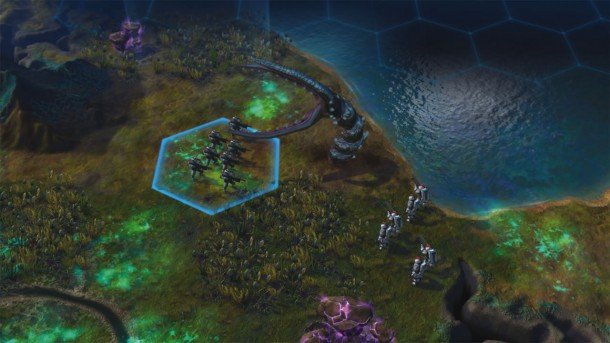Civilization: Beyond Earth interview - everything you need to know about the new factions, aliens, technology and more

PC Gamer: So you're always the first one to land on the planet you're colonising, and then other ones land afterward? How will that unfold?
David McDonough: Yeah, you're playing, you're exploring and then you'll get a popup, a communique, and you'll zoom over to see the ship for your opponent land, they'll establish their capital, you'll get first diplomatic contact with them, and you're free to go from there. It'll happen at some point between the first 40 - 50 turns.
PC Gamer: Have you taken another look at diplomacy? How will interacting with other factions work?
David McDonough: Diplomacy fundamentally is the same as in traditional civ when you call them up and you talk about whatever it is you want to talk about, but there's a lot more to talk about. IN addition to where you're settling and where your borders are, there's your attitude towards the aliens, you're riling them up and attacking my settlements, or there's a lot more covert ops, there's black hat ways to undermine your diplomatic relations. There's the orbital layer, 'don't put sattelites over my territory', and there's the divergence of affinity. As you choose Supremacy and your opponent chooses Harmony, those are not - attitudes are going to mesh, so that's going to lead to increased tensions, increased competition for resources. Your opponents are more oppositional by definition I think, because of the way your trajectories diverge over the course of the game.
PC Gamer: How does the AI choose which path to take? Are there set behaviour types?
David McDonough: Actually, that's a really good questions because, as Will was saying about the affinities, we don't want them to be synonymous with a certain way to win, or a certain way to play. Supremacy doesn't always mean military. So the civ with the more militaristic bent, which is Brazilia? may pick Supremacy, but they may not. Harmony would be just as good, Purity would be just as good as an expression of military strength. So the AI will make the same adaptive choices that you will. So if they start with a certain situation with alien neighbours, the terrain, they may find that their easiest path is one of the three affinities and the next time you play it'll be different. We also give them a little curve to their ball, so they tend to pick things that you don't. It's not like one big world of Harmony. If you go Harmony, they're going to go something else. That's a little bit of a designer device just to make things fun.
PC Gamer: Will there be a galactic or planetary council, a la Alpha Centauri?
The biggest gaming news, reviews and hardware deals
Keep up to date with the most important stories and the best deals, as picked by the PC Gamer team.
Will Miller: It's much more oppositional. There's no world congress or galactic council or anything like that. I think there are avenues for that sort of play through the diplomacy system. One of the systems we're really excited about is the white hat black hat covert ops. It takes espionage from Brave New World and expands it quite a bit. You can do many, many more things with spies when you get them in cities and things like smuggling from them and stealing their research and technology to things like planting the Dune thumper device in their city and having worms pop out. Only the Harmony player can do that. Or setting off a nuclear explosion, a dirty bomb in their city. There's some stuff that's white hat stuff that's done peacefully, that's not detrimental to the other player but is still clandestine, so if the AI catches you doing it they're not going to be pleased about it, but it benefits you and doesn't harm them as much. Then the more clandestine activity happens in a city, we call it intrigue, there's an intrigue level that increments. Once that gets real high you can start doing things that are more directly offensive, like detonating a bomb or sending the aliens to attack. That's a pretty cool avenue into the diplomacy system that's not "I'm going to talk to you now, let's have a conversation tree."
PC Gamer: How do you defend against that?
Will Miller: Well, we telegraph. It's not like you'll never know stuff is going to happen. You telegraph that the - there's a part of the HUD that's your intrigue. It's kind of like the stars from Grand Theft Auto. When you get five of them the cops are after you, you kind of understand what that means. Once it gets to a certain threshold you can see, you don't know who's doing it, but you can see that there's a lot of intrigue going on, so I'd better put counterspies in here, or I'd better build the office of homeland security to clamp it down. There's several ways, virtues, buildings, even satellites can assist you in defending yourself against covert action.
PC Gamer: What kind of units can you build?
David McDonough: Since obviously without the historic context there's no such thing as going from archers to guns. When you land on the planet you've got pretty good stuff—contemporary military plus. One of the favourite features from Alpha Centauri is the unit workshop, which everybody really likes, even though in our opinion the design of that could have been improved, so we did!
We decided on a different way to make your army customisable, and also feed back into your affinity, your cultural identity. So you have a catalogue of generic unit types that will upgrade as you level up. As your dominant affinity goes higher you'll be able to stack these guys with perks, with special abilities that are themed to that. Your marines can start out as normal marines, and then you play a little while and they level up to level two marines and you give them the anti-alien perk instead of the anti-city perk, because that's the kind of army you want to field. Then they have more abilities beyond that, so your stock types upgrade throughout the game.
About a third of the way into the game they start to get augmented by unique units, which are unique to affinities, they're not unique to affinities. So if you play the Supremacy path you will have access to Supremacy uniques—there's a catalogue of them, and they are themed along Supremacy ideals, so the first two are robots, basically droids, and they get more sophisticated from there. So there are robo-soldiers for Supremacy, using alien lifeforms as herds, or as cavalry, or breeding new creations for the Harmony player. Then the Purity player has the aforementioned flying fortresses. They're the tough guys, so they specialise in the float-stone, and they figure out how to mill it into a particular kind of ore that they can use to levitate truly massive objects. Their highest levels are the lev-tanks and the lev-destroyer, which is essentially a battleship that flies.
So depending on your playstyle you can look at these different styles of armies, and by the end of the game they're going to be totally different. Your army will be totally different than your neighbours, but balanced, so it's more like which of you is better at using your particular strengths?
PC Gamer: Does that separate the military tree from the tech tree, so you're not actually researching new units?
Will Miller: They're kinda tied. The central ring, the first simple techs you'll be able to get to quickly unlock the generic—they're not really generic, we call them the classes—so you research your tech to unlock the cavalry and the siege units, and the battleship and stuff like that. Then, once you have those categories unlocked, you can go into our version of the workshop, the unit upgrade screen, and that's where you see their progression tree. It starts out linear and then it branches depending on affinity.
So as you research affinities in the tech tree, the various branches unlock along that. Then each time you unlock an upgrade you get to pick one of these perks, so even within that selection, the affinity-based selection, you still get to specialise even further with the perks.
PC gamer: It feels like the factions are quite emergent. From their military, to the way they behave and their aspirations. There's a lot going into that mix, so when you meet another player, you really have to figure out what their deal is by looking at them, I imagine, and spying on them.
Will Miller: Covert ops is a good way to do that. One of the lower level things you can do is gather intelligence. You would send a spy to their city, gather intel, then you would get an intelligence report that says 'here's their level'. Depending on the level of the spy you'd get more detailed information—here's what they're researching, here are their affinity levels.
David McDonough: It is true that their actual aesthetic will change. The art team has done a lot of work to bring the affinities into the game visually, so the units will look different. Your high level Supremacy marines will look like these lithe, robotic gleaming things, versus the Purity marine, which is really heavily armoured with a heavy bore gun, so yeah. And their cities. Their building composition will change. Their leader will change. Everything about them will get coloured by their dominant affinity. It'll be impossible to miss.
Will Miller: It was really cool when our art team got spooled up. We started getting these concept art pieces in and we were like 'oh my god, we get to put that in Civ ? That's awesome! The robot samurai guy, the giant alien walker thing. This is going in a Civ game? That's so cool. They're used to a more research-oriented art process. When we said 'you guys just get to invent this' they had a lot of fun.
Part of the UK team, Tom was with PC Gamer at the very beginning of the website's launch—first as a news writer, and then as online editor until his departure in 2020. His specialties are strategy games, action RPGs, hack ‘n slash games, digital card games… basically anything that he can fit on a hard drive. His final boss form is Deckard Cain.


